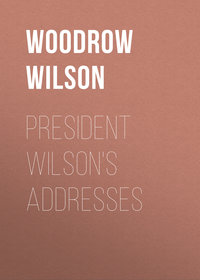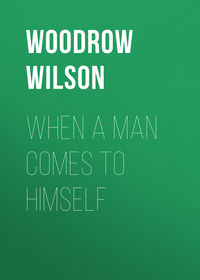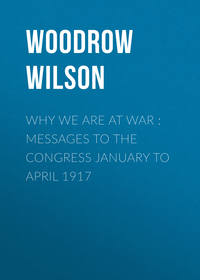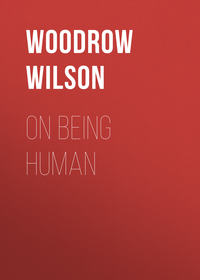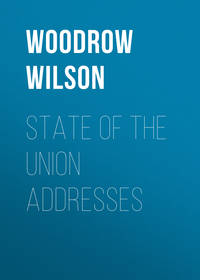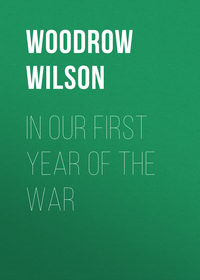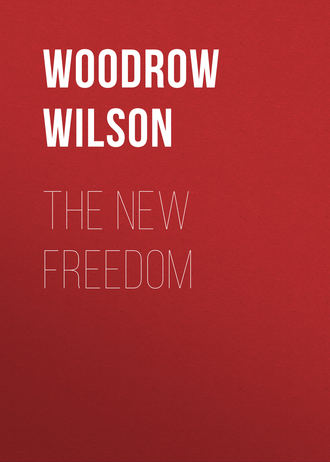 полная версия
полная версияThe New Freedom
No one man understands the United States. I have met some gentlemen who professed they did. I have even met some business men who professed they held in their own single comprehension the business of the United States; but I am educated enough to know that they do not. Education has this useful effect, that it narrows of necessity the circles of one's egotism. No student knows his subject. The most he knows is where and how to find out the things he does not know with regard to it. That is also the position of a statesman. No statesman understands the whole country. He should make it his business to find out where he will get the information necessary to understand at least a part of it at a time when dealing with complex affairs. What we need is a universal revival of common counsel.
I have sometimes reflected on the lack of a body of public opinion in our cities, and once I contrasted the habits of the city man with those of the countryman in a way which got me into trouble. I described what a man in a city generally did when he got into a public vehicle or sat in a public place. He doesn't talk to anybody, but he plunges his head into a newspaper and presently experiences a reaction which he calls his opinion, but which is not an opinion at all, being merely the impression that a piece of news or an editorial has made upon him. He cannot be said to be participating in public opinion at all until he has laid his mind alongside the minds of his neighbors and discussed with them the incidents of the day and the tendencies of the time.
Where I got into trouble was, that I ventured on a comparison. I said that public opinion was not typified on the streets of a busy city, but was typified around the stove in a country store where men sat and probably chewed tobacco and spat into a sawdust box, and made up, before they got through, what was the neighborhood opinion both about persons and events; and then, inadvertently, I added this philosophical reflection, that, whatever might be said against the chewing of tobacco, this at least could be said for it: that it gave a man time to think between sentences. Ever since then I have been represented, particularly in the advertisements of tobacco firms, as in favor of the use of chewing tobacco!
The reason that some city men are not more catholic in their ideas is that they do not share the opinion of the country, and the reason that some countrymen are rustic is that they do not know the opinion of the city; they are both hampered by their limitations. I heard the other day of a woman who had lived all her life in a city and in an hotel. She made a first visit to the country last summer, and spent a week in a farmhouse. Asked afterward what had interested her most about her experience, she replied that it was hearing the farmer "page his cows!"
A very urban point of view with regard to a common rustic occurrence, and yet that language showed the sharp, the inelastic limits of her thought. She was provincial in the extreme; she thought even more narrowly than in the terms of a city; she thought in the terms of an hotel. In proportion as we are confined within the walls of one hostelry or one city or one state, we are provincial. We can do nothing more to advance our country's welfare than to bring the various communities within the counsels of the nation. The real difficulty of our nation has been that not enough of us realized that the matters we discussed were matters of common concern. We have talked as if we had to serve now this part of the country and again that part, now this interest and again that interest; as if all interests were not linked together, provided we understood them and knew how they were related to one another.
If you would know what makes the great river as it nears the sea, you must travel up the stream. You must go up into the hills and back into the forests and see the little rivulets, the little streams, all gathering in hidden places to swell the great body of water in the channel. And so with the making of public opinion: Back in the country, on the farms, in the shops, in the hamlets, in the homes of cities, in the schoolhouses, where men get together and are frank and true with one another, there come trickling down the streams which are to make the mighty force of the river, the river which is to drive all the enterprises of human life as it sweeps on into the great common sea of humanity.
I feel nothing so much as the intensity of the common man. I can pick out in any audience the men who are at ease in their fortunes: they are seeing a public man go through his stunts. But there are in every crowd other men who are not doing that,—men who are listening as if they were waiting to hear if there were somebody who could speak the thing that is stirring in their own hearts and minds. It makes a man's heart ache to think that he cannot be sure that he is doing it for them; to wonder whether they are longing for something that he does not understand. He prays God that something will bring into his consciousness what is in theirs, so that the whole nation may feel at last released from its dumbness, feel at last that there is no invisible force holding it back from its goal, feel at last that there is hope and confidence and that the road may be trodden as if we were brothers, shoulder to shoulder, not asking each other anything about differences of class, not contesting for any selfish advance, but united in the common enterprise.
The burden that is upon the heart of every conscientious public man is the burden of the thought that perhaps he does not sufficiently comprehend the national life. For, as a matter of fact, no single man does comprehend it. The whole purpose of democracy is that we may hold counsel with one another, so as not to depend upon the understanding of one man, but to depend upon the counsel of all. For only as men are brought into counsel, and state their own needs and interests, can the general interests of a great people be compounded into a policy that will be suitable to all.
I have realized all my life, as a man connected with the tasks of education, that the chief use of education is to open the understanding to comprehend as many things as possible. That it is not what a man knows,—for no man knows a great deal,—but what a man has upon his mind to find out; it is his ability to understand things, it is his connection with the great masses of men that makes him fit to speak for others,—and only that. I have associated with some of the gentlemen who are connected with the special interests of this country (and many of them are pretty fine men, I can tell you), but, fortunately for me, I have associated with a good many other persons besides; I have not confined my acquaintance to these interesting groups, and I can actually tell those gentlemen some things that they have not had time to find out. It has been my great good fortune not to have had my head buried in special undertakings, and, therefore, I have had an occasional look at the horizon. Moreover, I found out, a long time ago, fortunately for me, when I was a boy, that the United States did not consist of that part of it in which I lived. There was a time when I was a very narrow provincial, but happily the circumstances of my life made it necessary that I should go to a very distant part of the country, and I early found out what a very limited acquaintance I had with the United States, found out that the only thing that would give me any sense at all in discussing the affairs of the United States was to know as many parts of the United States as possible.
The men who have been ruling America must consent to let the majority into the game. We will no longer permit any system to go uncorrected which is based upon private understandings and expert testimony; we will not allow the few to continue to determine what the policy of the country is to be. It is a question of access to our own government. There are very few of us who have had any real access to the government. It ought to be a matter of common counsel; a matter of united counsel; a matter of mutual comprehension.
So, keep the air clear with constant discussion. Make every public servant feel that he is acting in the open and under scrutiny; and, above all things else, take these great fundamental questions of your lives with which political platforms concern themselves and search them through and through by every process of debate. Then we shall have a clear air in which we shall see our way to each kind of social betterment. When we have freed our government, when we have restored freedom of enterprise, when we have broken up the partnerships between money and power which now block us at every turn, then we shall see our way to accomplish all the handsome things which platforms promise in vain if they do not start at the point where stand the gates of liberty.
I am not afraid of the American people getting up and doing something. I am only afraid they will not; and when I hear a popular vote spoken of as mob government, I feel like telling the man who dares so to speak that he has no right to call himself an American. You cannot make a reckless, passionate force out of a body of sober people earning their living in a free country. Just picture to yourselves the voting population of this great land, from the sea to the far borders in the mountains, going calmly, man by man, to the polls, expressing its judgment about public affairs: is that your image of "a mob?"
What is a mob? A mob is a body of men in hot contact with one another, moved by ungovernable passion to do a hasty thing that they will regret the next day. Do you see anything resembling a mob in that voting population of the countryside, men tramping over the mountains, men going to the general store up in the village, men moving in little talking groups to the corner grocery to cast their ballots,—is that your notion of a mob? Or is that your picture of a free, self-governing people? I am not afraid of the judgments so expressed, if you give men time to think, if you give them a clear conception of the things they are to vote for; because the deepest conviction and passion of my heart is that the common people, by which I mean all of us, are to be absolutely trusted.
So, at this opening of a new age, in this its day of unrest and discontent, it is our part to clear the air, to bring about common counsel; to set up the parliament of the people; to demonstrate that we are fighting no man, that we are trying to bring all men to understand one another; that we are not the friends of any class against any other class, but that our duty is to make classes understand one another. Our part is to lift so high the incomparable standards of the common interest and the common justice that all men with vision, all men with hope, all men with the convictions of America in their hearts, will crowd to that standard and a new day of achievement may come for the liberty which we love.
VI
LET THERE BE LIGHT
The concern of patriotic men is to put our government again on its right basis, by substituting the popular will for the rule of guardians, the processes of common counsel for those of private arrangement. In order to do this, a first necessity is to open the doors and let in the light on all affairs which the people have a right to know about.
In the first place, it is necessary to open up all the processes of our politics. They have been too secret, too complicated, too roundabout; they have consisted too much of private conferences and secret understandings, of the control of legislation by men who were not legislators, but who stood outside and dictated, controlling oftentimes by very questionable means, which they would not have dreamed of allowing to become public. The whole process must be altered. We must take the selection of candidates for office, for example, out of the hands of small groups of men, of little coteries, out of the hands of machines working behind closed doors, and put it into the hands of the people themselves again by means of direct primaries and elections to which candidates of every sort and degree may have free access. We must substitute public for private machinery.
It is necessary, in the second place, to give society command of its own economic life again by denying to those who conduct the great modern operations of business the privacy that used to belong properly enough to men who used only their own capital and their individual energy in business. The processes of capital must be as open as the processes of politics. Those who make use of the great modern accumulations of wealth, gathered together by the dragnet process of the sale of stocks and bonds, and piling up of reserves, must be treated as under a public obligation; they must be made responsible for their business methods to the great communities which are in fact their working partners, so that the hand which makes correction shall easily reach them and a new principle of responsibility be felt throughout their structure and operation.
What are the right methods of politics? Why, the right methods are those of public discussion: the methods of leadership open and above board, not closeted with "boards of guardians" or anybody else, but brought out under the sky, where honest eyes can look upon them and honest eyes can judge of them.
If there is nothing to conceal, then why conceal it? If it is a public game, why play it in private? If it is a public game, then why not come out into the open and play it in public? You have got to cure diseased politics as we nowadays cure tuberculosis, by making all the people who suffer from it live out of doors; not only spend their days out of doors and walk around, but sleep out of doors; always remain in the open, where they will be accessible to fresh, nourishing, and revivifying influences.
I, for one, have the conviction that government ought to be all outside and no inside. I, for my part, believe that there ought to be no place where anything can be done that everybody does not know about. It would be very inconvenient for some gentlemen, probably, if government were all outside, but we have consulted their susceptibilities too long already. It is barely possible that some of these gentlemen are unjustly suspected; in that case they owe it to themselves to come out and operate in the light. The very fact that so much in politics is done in the dark, behind closed doors, promotes suspicion. Everybody knows that corruption thrives in secret places, and avoids public places, and we believe it a fair presumption that secrecy means impropriety. So, our honest politicians and our honorable corporation heads owe it to their reputations to bring their activities out into the open.
At any rate, whether they like it or not, these affairs are going to be dragged into the open. We are more anxious about their reputations than they are themselves. We are too solicitous for their morals,—if they are not,—to permit them longer to continue subject to the temptations of secrecy. You know there is temptation in loneliness and secrecy. Haven't you experienced it? I have. We are never so proper in our conduct as when everybody can look and see exactly what we are doing. If you are off in some distant part of the world and suppose that nobody who lives within a mile of your home is anywhere around, there are times when you adjourn your ordinary standards. You say to yourself: "Well, I'll have a fling this time; nobody will know anything about it." If you were on the desert of Sahara, you would feel that you might permit yourself,—well, say, some slight latitude in conduct; but if you saw one of your immediate neighbors coming the other way on a camel,—you would behave yourself until he got out of sight. The most dangerous thing in the world is to get off where nobody knows you. I advise you to stay around among the neighbors, and then you may keep out of jail. That is the only way some of us can keep out of jail.
Publicity is one of the purifying elements of politics. The best thing that you can do with anything that is crooked is to lift it up where people can see that it is crooked, and then it will either straighten itself out or disappear. Nothing checks all the bad practices of politics like public exposure. You can't be crooked in the light. I don't know whether it has ever been tried or not; but I venture to say, purely from observation, that it can't be done.
And so the people of the United States have made up their minds to do a healthy thing for both politics and big business. Permit me to mix a few metaphors: They are going to open doors; they are going to let up blinds; they are going to drag sick things into the open air and into the light of the sun. They are going to organize a great hunt, and smoke certain animals out of their burrows. They are going to unearth the beast in the jungle in which when they hunted they were caught by the beast instead of catching him. They have determined, therefore, to take an axe and raze the jungle, and then see where the beast will find cover. And I, for my part, bid them God-speed. The jungle breeds nothing but infection and shelters nothing but the enemies of mankind.
And nobody is going to get caught in our hunt except the beasts that prey. Nothing is going to be cut down or injured that anybody ought to wish preserved.
You know the story of the Irishman who, while digging a hole, was asked, "Pat, what are you doing,—digging a hole?" And he replied, "No, sir; I am digging the dirt, and laying the hole." It was probably the same Irishman who, seen digging around the wall of a house, was asked, "Pat, what are you doing?" And he answered, "Faith, I am letting the dark out of the cellar." Now, that's exactly what we want to do,—let the dark out of the cellar.
Take, first, the relations existing between politics and business.
It is perfectly legitimate, of course, that the business interests of the country should not only enjoy the protection of the law, but that they should be in every way furthered and strengthened and facilitated by legislation. The country has no jealousy of any connection between business and politics which is a legitimate connection. It is not in the least averse from open efforts to accommodate law to the material development which has so strengthened the country in all that it has undertaken by supplying its extraordinary life with its necessary physical foundations.
But the illegitimate connections between business and legislation are another matter. I would wish to speak on this subject with soberness and circumspection. I have no desire to excite anger against anybody. That would be easy, but it would do no particular good. I wish, rather, to consider an unhappy situation in a spirit that may enable us to account for it, to some extent, and so perhaps get at the causes and the remedy. Mere denunciation doesn't help much to clear up a matter so involved as is the complicity of business with evil politics in America.
Every community is vaguely aware that the political machine upon which it looks askance has certain very definite connections with men who are engaged in business on a large scale, and the suspicion which attaches to the machine itself has begun to attach also to business enterprises, just because these connections are known to exist. If these connections were open and avowed, if everybody knew just what they involved and just what use was being made of them, there would be no difficulty in keeping an eye upon affairs and in controlling them by public opinion. But, unfortunately, the whole process of law-making in America is a very obscure one. There is no highway of legislation, but there are many by-ways. Parties are not organized in such a way in our legislatures as to make any one group of men avowedly responsible for the course of legislation. The whole process of discussion, if any discussion at all takes place, is private and shut away from public scrutiny and knowledge. There are so many circles within circles, there are so many indirect and private ways of getting at legislative action, that our communities are constantly uneasy during legislative sessions. It is this confusion and obscurity and privacy of our legislative method that gives the political machine its opportunity. There is no publicly responsible man or group of men who are known to formulate legislation and to take charge of it from the time of its introduction until the time of its enactment. It has, therefore, been possible for an outside force,—the political machine, the body of men who nominated the legislators and who conducted the contest for their election,—to assume the rôle of control. Business men who desired something done in the way of changing the law under which they were acting, or who wished to prevent legislation which seemed to them to threaten their own interests, have known that there was this definite body of persons to resort to, and they have made terms with them. They have agreed to supply them with money for campaign expenses and to stand by them in all other cases where money was necessary if in return they might resort to them for protection or for assistance in matters of legislation. Legislators looked to a certain man who was not even a member of their body for instructions as to what they were to do with particular bills. The machine, which was the centre of party organization, was the natural instrument of control, and men who had business interests to promote naturally resorted to the body which exercised the control.
There need have been nothing sinister about this. If the whole matter had been open and candid and honest, public criticism would not have centred upon it. But the use of money always results in demoralization, and goes beyond demoralization to actual corruption. There are two kinds of corruption,—the crude and obvious sort, which consists in direct bribery, and the much subtler, more dangerous, sort, which consists in a corruption of the will. Business men who have tried to set up a control in politics through the machine have more and more deceived themselves, have allowed themselves to think that the whole matter was a necessary means of self-defence, have said that it was a necessary outcome of our political system. Having reassured themselves in this way, they have drifted from one thing to another until the questions of morals involved have become hopelessly obscured and submerged. How far away from the ideals of their youth have many of our men of business drifted, enmeshed in the vicious system,—how far away from the days when their fine young manhood was wrapped in "that chastity of honor which felt a stain like a wound!"
It is one of the happy circumstances of our time that the most intelligent of our business men have seen the mistake as well as the immorality of the whole bad business. The alliance between business and politics has been a burden to them,—an advantage, no doubt, upon occasion, but a very questionable and burdensome advantage. It has given them great power, but it has also subjected them to a sort of slavery and a bitter sort of subserviency to politicians. They are as anxious to be freed from bondage as the country is to be rid of the influences and methods which it represents. Leading business men are now becoming great factors in the emancipation of the country from a system which was leading from bad to worse. There are those, of course, who are wedded to the old ways and who will stand out for them to the last, but they will sink into a minority and be overcome. The rest have found that their old excuse (namely, that it was necessary to defend themselves against unfair legislation) is no longer a good excuse; that there is a better way of defending themselves than through the private use of money. That better way is to take the public into their confidence, to make absolutely open all their dealings with legislative bodies and legislative officers, and let the public judge as between them and those with whom they are dealing.
This discovery on their part of what ought to have been obvious all along points out the way of reform; for undoubtedly publicity comes very near being the cure-all for political and economic maladies of this sort. But publicity will continue to be very difficult so long as our methods of legislation are so obscure and devious and private. I think it will become more and more obvious that the way to purify our politics is to simplify them, and that the way to simplify them is to establish responsible leadership. We now have no leadership at all inside our legislative bodies,—at any rate, no leadership which is definite enough to attract the attention and watchfulness of the country. Our only leadership being that of irresponsible persons outside the legislatures who constitute the political machines, it is extremely difficult for even the most watchful public opinion to keep track of the circuitous methods pursued. This undoubtedly lies at the root of the growing demand on the part of American communities everywhere for responsible leadership, for putting in authority and keeping in authority those whom they know and whom they can watch and whom they can constantly hold to account. The business of the country ought to be served by thoughtful and progressive legislation, but it ought to be served openly, candidly, advantageously, with a careful regard to letting everybody be heard and every interest be considered, the interest which is not backed by money as well as the interest which is; and this can be accomplished only by some simplification of our methods which will centre the public trust in small groups of men who will lead, not by reason of legal authority, but by reason of their contact with and amenability to public opinion.


